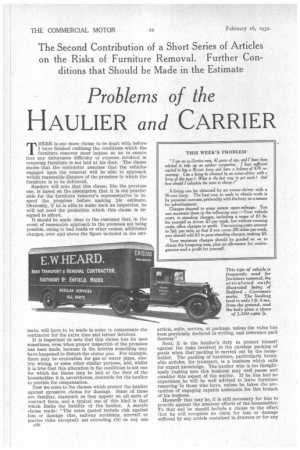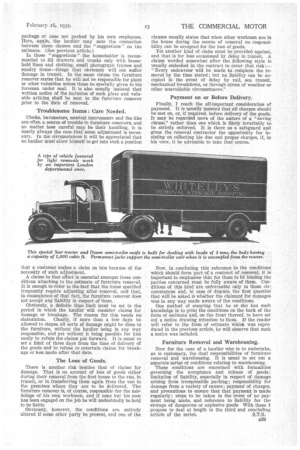Problems of the
Page 56

Page 57

If you've noticed an error in this article please click here to report it so we can fix it.
HAULIER and CARRIER THERE is one more clause to be dealt with before I have finished outlining the conditions which the furniture remover must impose so as to ensure that any unforeseen difficulty or expense involved in removing furniture is not laid at his door. The clause states that the contractor assumes that the vehicles engaged upon the removal will be able to approach within reasonable distance of the premises to which the furniture is to be delivered.
Readers will note that this clause, like the previous one, is based on the assumption that it is not practicable for the furniture remover's representative to inspect the premises before making his estimate. Obviously, if he isable to make such an inspection, he will not need the protection which this clause is designed to afford.
It should be made clear to the customer that, in the event of reasonable approach to the premises not being possible, owing to bad roads or other causes, additional charges, over and above the figure included in the esti mate, will have to be made in order to compensate the contractor for the extra time and labour involved.
It is important to note that this clause has its uses sometimes, even when proper inspection of the premises has been made, because in the interim something may have happened to disturb the status quo. For example, there may be excavation for gas or water pipes, electric wiring, or some other similar purpose, and, whilst it is true that this alteration in the conditions is not one for which the blame may be laid at the door of the householder, it is, nevertheless, desirable for the haulier to provide for compensation.
Now we come to the clauses which protect the haulier against excessive claims for damage. Some of these are familiar, inasmuch as they appear on all sorts of contract form, and a typical one of this kind is that which limits the liability of the haulier. A sample clause reads : "The rates quoted include risk against loss or damage (fire, railway accidents, aircraft or marine risks excepted) not exceeding £1.0 on any one article, suite, service, or package, unless the value has been previously declared in writing, and insurance paid thereon."
Next, it is the haulier's duty to protect himself against the risks involved in the careless packing of goods when that packing is carried out by the householder. The packing of furniture, particularly breakable articles, for transport, is a business which calls for expert knowledge. The haulier who is too thoughtlessly rushing into this business may well pause and consider this aspect of the matter. If he has had no experience he will be well advised to leave furniture removing lo those who have, unless he takes the precaution of engaging capable assistants for this branch of his business.
However that may be, it is still necessary for him to provide against the amateur efforts of the householder. To that end he should include a clause to the effect that he will recognize no claim for loss or damage suffered by any article contained in drawers or for any package or case not packed by his own employees. Here, again, the haulier may note the connection between these clauses and the " suggestions " on the estimate. (See previous article.) In those " suggestions " the householder is recommended to fill drawers and trunks only with household linen and clothing, small photograph frames and sundry items—things that obviously will not suffer damage in transit. In the same clause the furniture remover states that he will not be responsible for plate or other valuables unless these be specially given to his foreman under seal. It is also usually insisted that written, notice of the inclusion of such plate and valuable articles shall be sent to the furniture remover prior to the date of removal.
Troublesome Items : Care Needed.
Clocks, barometers, musical instruments and the like are often a source of trouble to furniture removers, and no matter how careful may be their handling, it is nearly always the case that some adjustment is necessary. In the circumstances it will be appreciated that no haulier must show himself to get into such a position that a customer makes a claim on him because of the necessity of such adjustment.
A clause to that effect is essential amongst these conditions attaching to the estimate of furniture removal. It is enough to refer to the fact that the items specified frequently require adjusting after removal, and that, in consequence of that fact, the furniture remover does not accept any liability in respect of them.
Obviously, a definite time limit must be set to the period in which the haulier will consider claims for damage or breakage. The reason for this needs no elaboration. Clearly, if more than a few days be allowed to elapse all sorts of damage might be done to the furniture, without the haulier being in any way responsible, and yet without it being possible for him easily to refute the claims put forward. It is usual to set a Unlit of three days from the time of delivery of the goods and to refuse to entertain claims for breakage or loss made after that date.
The Loss of Goods.
There is another risk besides that of claims for damage. That is on account of loss of goods either during their removal from the first house to the van, in transit, or in transferring them again from the van to the premises where they are to be delivered. The furniture remover is, of course, responsible for the raisdoings of his own workmen, and if none but his men has been engaged on the job he will undoubtedly be held to be liable.
Obviously, however, the conditions are entirely altered if some other party be present, and one of the clauses usually states that when other workmen are in the house during the course of removal no responsibility can he accepted for the loss of goods.
Yet another kind of claim must be provided against, and that is for loss occasioned by delay in transit. A clause worded somewhat after the following style is usually embodied in the contract to cover that risk :— "Every endeavour will be made to complete the removal by the time stated ; but no liability can be accepted in the event of delay by rail, sea transit, mechanical breakdown, or through stress of weather or other unavoidable circumstances."
Payment on or Before Delivery.
Finally, I reach the all-important consideration of payment. It is usually insisted that all charges should be met on, or, if required, before delivery of the goods. It may be regarded more of the nature of a "saving clause," rather than one which is likely invariably to be strictly enforced. It is there as a safeguard and gives the removal contractor the opportunity for insisting on collecting his due and proper charges, if, in his view, it be advisable to take that course.
Now, in concluding this reference to the conditions which should form part of a contract of removal, if is important to emphasize that for them to bi binding the parties concerned must be fully aware of than. Conditions of this kind are enforceable only in those circumstances and, in case of dispute., the first question that will be asked is whether the claimant for damages was in any way made• aware of the conditions.
One method of ensuring that he or she has such knowledge is to print the conditions on the back of the form of estimate and, on the front thereof, to have set out a notice drawing attention to them. If the reader will refer to the form of estimate which was reproduced in the previous article, he will observe that such a notice was included.
Furniture Removal and Warehousing.
Now for the case of a haulier who is to undertake, as is customary, the dual responsibilities of furniture removal and warehousing. It is usual to set out a separate series of conditions relating to warehousing.
These conditions are concerned with formalities governing the acceptance and release of goods; limitation of liability, especially in respect of damage arising from irresponsible packing; responsibility for damage from a variety of causes ; payment of charges, and precautions to ensure that that payment is made regularly ; steps to be taken in the event of no payment being made, and reference to liability for the storage of dangerous or explosive goods With these I propose to deal at length in the third and concluding article of the series. S.T.R.




































































































